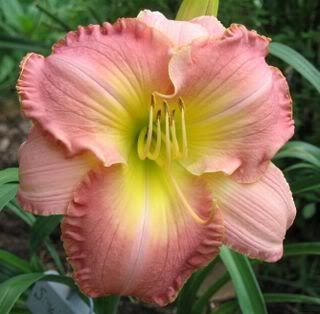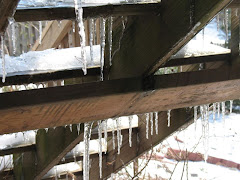I emailed a couple of challenges I regularly face in my garden (maybe you do, too) to Dr. Gillman and he was kind enough to reply.
My email:
Greetings, Jeff:
Okay! How about aphids? Here's my problemo....I have lots (ahem) of daylilies and yes, given time, the ladybugs do take care of them...but, for the last couple of years I have noticed that it is not in time....
Roses, for instance, can withstand them and bloom on...my daylilies, however, especially the dark colors, suffer damage..that shows up later. Light colors don't show the damage or show it very much, but those purples...they can be ruined. There's nothing like waiting with great anticipation for some special blooms...and have them turn out splotchy/misshapen, etc..
Using a strong water stream..for daylilies, is not effective as you can knock off buds or do more damage...I'm not patient enough (this year) to just ride them out.
If you show daylilies or if you sell them...I know those folks use warfare! All the big hybridizers have spraying programs...well, partially because the southern ones must fight rust...but, anyway, back to the aphids...
So, what might I use/try....I would not like to knock everything out as I do have quite a variety of beneficial insects as there is quite a bit of diversity here (shocking, I know). I would just like to engage the battle on the daylilies...is this possible?? Oh, they're out there now...with this warmer weather we've been having...however, I'm not too worried now as I won't see scaping for a while yet.
The other thing is I really fight powdery mildew on my phlox. Last year was particularly bad because, I think, we were in drought and on severe mandatory water restrictions (pray that it is not so this year...but I am not optimistic...I'm afraid local politics enters into this as much or more than actual conditions... I hope not...sorry, I digress). Anyway, with my watering options most likely limited...how might I battle this? To give you an idea, I have something like 17 varieties of phlox and some seedlings...so, not a pretty sight when they're covered.
Now, are you sorry you asked? Ha. Well, this is wonderful (for me)...I do think it will be great to have some information out there on two common problems and what the options might be.
Thank you so much!
*****
His most gracious reply:
OK, here we go, how to get rid of aphids....
Aphids rarely cause enough of a problem that they NEED to be killed.
In
other words, although they can be pretty unsightly, they rarely do
enough damage to severely stunt the growth of the plant, so I'm glad to
hear that mostly you do nothing. That's what I prefer also. However,
what should you do when problems become severe? The hose-off method
is
a favorite, but obviously that isn't working for you because you may
spray buds off. This past summer a friend of mine, Jeff Hahn, and I
tried a bunch of different sprays for knocking out aphids and we found
that the most effective homemade spray was soapy water (2 tablespoons
of
dishsoap per gallon water). Here's the thing though, dish soap can
severely damage plants if it's too concentrated and the concentration
that I just listed is pretty concentrated and will damage some plants,
so you've got to be careful and test this spray before you apply it
willy-nilly. Or you could just use safer soap that you buy at the
garden center. There are plenty of synthetic and organic sprays sprays
that can kill aphids, but for most gardeners they're excessively
effective -- they'll kill good insects as well as bad and put you on an
endless treadmill of needing to apply pesticides because you have no
beneficial insects. So if I were you and was looking for a short term
solution I'd go with soap. If you do end up going with a more toxic
spray I'd pick something whose active ingredient is acephate (Orthene).
Alternatively you could try tanglefoot -- it's a sticky paste that you
can put around the portion of the plant you want to protect (for
example, just below -- but not on -- daylily flower buds). Most
insects
will either die trying to cross this stuff or not cross it at all. It
works pretty well -- you will have a few "escapes" though. And you
will
get messy, especially the first time you use it.
Powdery mildew huh? Everyone seems to want a good way to get rid of
that. For the most part powdery mildew isn't that terrible a pest, but
if you're worried you could try a variety of things. Once again I tend
to like to avoid the more toxic sprays, but you can find potassium
bicarbonate in the garden center and it should work pretty well (It's
similar to baking soda -- which you could also try) you could also try
spraying once a week with a mixture of one part milk to two parts water
-- we've found that that is a pretty effective fungicide (any type of
milk should work -- well -- maybe not chocolate). Or you could just
spray the phlox every day with water. Sure, it sounds
counter-intuitive, but powdery mildew is the one fungus that doesn't
like to get wet. If you are going to use a spray to try to control
powdery mildew you need to start applying very early in the
infestation. If you don't they won't be very effective. If you do
want
to go with something synthetic then you will probably want something
with chlorotalonil as the active ingredient. It will be very effective
and I prefer it to most organic fungicides with the exception of
potassium bicarbonate which I mentioned above.
I'll be checking this blog so if you have any questions or comments
please don't hesitate to let me know.
Thanks,
Jeff
*******
Wow! I hope you enjoyed this as much as I did/have! Thanks so much,
Dr. Jeff Gillman! It's been a pleasure.
******
Update: Please see my follow up email and Dr. Gillman's response:
Hey Jeff: Just a quick note to say that someone pointed out to me
(correctly, I'm pretty sure) that I was really
complaining about thrip damage to my daylilies. Doggone, I should have
known that! Aphids are cool season, thrips warm season pests...as she
reminded me. Anyway, she thinks there is only a chemical control for
aphids and suggested I ask you.
His response:
Thrips .... OK, thrips are tough. the tanglefoot will still work for thrips,
but not quite as well. Acephate is a waste of time and a hard spray of
water will kind of work OK -- better than nothing but not great. You
may try predators such as the minute pirate bug. If you want fast
control there is a spray (which happens to be organic) that works well.
It is also pretty specific for pests so it's relatively easy on predators.
The active ingredient is spinosad -- I believe that you can
get this at Gardens Alive as Bullseye or something similar.
*****
Thanks again to Dr. Gillman for his expertise!




















